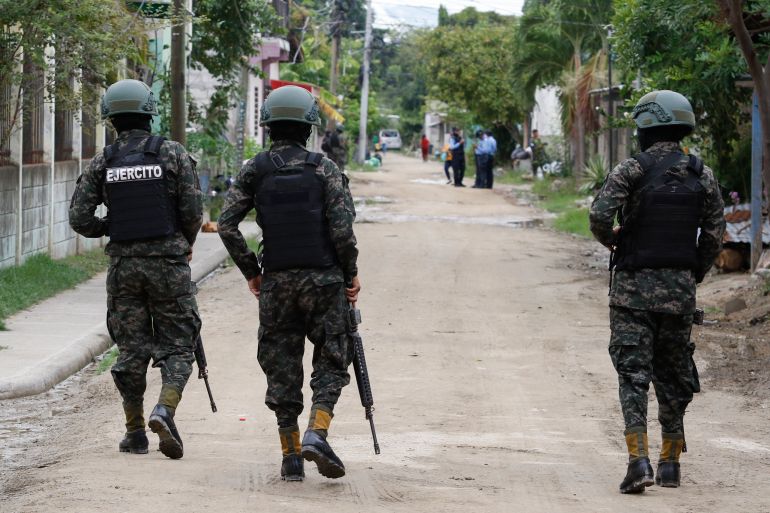The state of exception in Honduras is endangering innocent lives
The heavy-handed security measures introduced to tackle gang violence have triggered a spike in abuses and deaths.

When Honduran President Xiomara Castro was elected in November 2021 after running on an anticorruption platform and promising to tackle the country’s disastrous human rights record and sky-high homicide and extortion rates, hopes ran high. She committed to working with affected communities, listening to their needs and taking action. But the sense of optimism did not last long.
In December 2022, less than a year after taking office as Honduras’s first woman president, Castro declared a state of exception covering parts of the country with the highest crime rates. She said the extraordinary measures were required to fight insecurity, particularly extortions.
Castro appeared to be following the strategy embraced by President Nayib Bukele in El Salvador in 2022 despite its terrifying consequences for human rights.
Under the state of exception, the Honduran authorities suspended constitutional rights, including the freedom of movement, assembly and association, as well as protection against arbitrary detentions.
The military police were allowed to make arrests and search homes without a warrant. In a country where security forces have an abysmal human rights record, granting a police force such extraordinary powers was nothing short of bad news.
These measures were meant to be temporary, but a year on, they are still in place. On December 6, we marked the first anniversary of the state of exception. These are 12 months in which the people of Honduras have faced countless abuses officially condoned by law.
Honduras has undoubtedly endured very real and extremely serious security problems with gangs terrorising the population, including by limiting their ability to move from one area to another. But the militarisation of security is putting everybody in danger.
Human rights organisations have documented a rise in arbitrary arrests, extrajudicial executions and enforced disappearances across the country since the state of exception was declared.
The Office of the National Human Rights Commissioner in Honduras received 286 reports of human rights violations between December 2022 and September 2023 alone.
Several experts from the United Nations who have independently visited Honduras over the course of the year have described the situation as alarming.
A statement issued at the end of UN Special Rapporteur on Extrajudicial Executions Morris Tidball-Binz’s visit to the country highlighted that extrajudicial killings are “still a widespread phenomenon”. Tidball-Binz was quoted as saying that the judicial process is hampered by “limited investigative capacity and a culture of impunity”.
Amnesty International has also uncovered evidence of widespread abuses. Rihanna Ferrera, an activist and member of the National Mechanism Against Torture, a body made up by government officials and independent organisations, told an Amnesty team they have seen an increasing number of cases of young men from marginalised areas being detained without any concrete evidence. She said the authorities are criminalising poverty.
Ferrera has documented cases of young men who are detained and then driven around to be beaten and abused before their arrests are even registered at the police station. She claimed this is a way of encouraging forced confessions, to show authorities are doing something to tackle crime.
The situation in prisons has also deteriorated, with the military police taking charge of the whole prison system in June. This move came after the eruption of violence between two gangs in a prison in Támara, near the capital Tegucigalpa, took the lives of 46 women.
But activists said that instead of working to make prisons safer, the authorities are punishing those held behind bars by withholding food and banning family visits, which for most are the only way to access basic products. Human rights organisations are also being prevented from entering prisons, which opens the door for more abuses to take place.
Activists who have tried to report the growing number human rights violations taking place during the state of exception have been harassed and subjected to smear campaigns or worse – have become targets of abuses themselves. It is not surprising many are scared to even speak up.
Between January 2021 and September 2023, the Office of the High Commissioner for Human Rights documented 944 attacks against journalists and human rights defenders, including 40 murders.
Honduras’s security challenges are real and extremely complex and require multifaceted strategies to tackle. However, cancelling basic human rights to try to solve this crisis is only creating an even greater one.
Mass arrests and impunity for abuses put the lives of ordinary Hondurans at risk. Such measures also strengthen the criminal organisations that they are supposed to fight by creating an atmosphere of fear and chaos.
Instead of continuing to promote a short-sighted approach to security, the Honduran authorities should invest time and resources in developing a long-term security strategy that places respect for human rights at its core.
A first step towards this could be strengthening the judicial system, by providing it with the necessary resources and staff to ensure that organised crime is investigated adequately and effectively and that those responsible for human rights violations face justice. Measures must also be taken to tackle poverty and inequality, some of the main underlying causes of crime.
Switching gears in the fight against crime may indeed be challenging and require resources. But Honduras can achieve it and receive international support if it shows that there is pollical will, not only to commit to sustainable changes, but to actually implement them.
The views expressed in this article are the author’s own and do not necessarily reflect Al Jazeera’s editorial stance.
